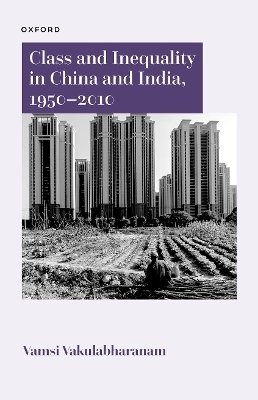
Class and Inequality in China and India, 1950–2010
Seiten
2024
Oxford University Press (Verlag)
978-0-19-893412-7 (ISBN)
Oxford University Press (Verlag)
978-0-19-893412-7 (ISBN)
- Noch nicht erschienen
- Versandkostenfrei
- Auch auf Rechnung
- Artikel merken
By meticulously analyzing India and China's inequality stories between 1950 and 2010 through a class lens, this book locates inequality in these countries within the larger contexts of Asian and global capitalism.
China and India have long been central to the world economy. Two and a half centuries ago, they contributed 50 percent of the world output; after suffering a decline thereafter, their share fell to a paltry 9 percent in 1950 but has since resurged to over 25 percent today. Their growth and inequality experiences have had strikingly similar trajectories following India's independence (1947) and the Chinese revolution (1949). This book offers novel insights by meticulously analyzing the Chinese and Indian inequality stories (1950–2010) through a class lens. Moreover, it locates their inequality stories within the larger contexts of Asian and global capitalism. Vakulabharanam demonstrates that the mutual interconnectedness between Chinese and Indian growth and inequality dynamics and the transformation and evolution of global capitalism is key to understanding the within-country inequality dynamics in both countries. The book thus offers a new framework on economic development and inequality that builds on and adds to the insights of Kuznets and Piketty.
China and India have long been central to the world economy. Two and a half centuries ago, they contributed 50 percent of the world output; after suffering a decline thereafter, their share fell to a paltry 9 percent in 1950 but has since resurged to over 25 percent today. Their growth and inequality experiences have had strikingly similar trajectories following India's independence (1947) and the Chinese revolution (1949). This book offers novel insights by meticulously analyzing the Chinese and Indian inequality stories (1950–2010) through a class lens. Moreover, it locates their inequality stories within the larger contexts of Asian and global capitalism. Vakulabharanam demonstrates that the mutual interconnectedness between Chinese and Indian growth and inequality dynamics and the transformation and evolution of global capitalism is key to understanding the within-country inequality dynamics in both countries. The book thus offers a new framework on economic development and inequality that builds on and adds to the insights of Kuznets and Piketty.
Vamsi Vakulabharanam is Co-Director of the Asian Political Economy Program and Associate Professor of Economics at the University of Massachusetts, Amherst. He has previously taught at the University of Hyderabad (2008-14) and the City University of New York (2004-07). His recent research focuses on inequality in India and China and the political economy of Indian cities through the axes of gender, caste, class, and religion. In the past, he has also worked on agrarian change in developing economies, agrarian cooperatives, and the relationship between economic development and inequality. Vakulabharanam was awarded the Amartya Sen award in 2013 by the Indian Council of Social Science Research.
| Erscheint lt. Verlag | 30.12.2024 |
|---|---|
| Reihe/Serie | Oxford India-China Studies |
| Verlagsort | Oxford |
| Sprache | englisch |
| Maße | 140 x 216 mm |
| Themenwelt | Sozialwissenschaften ► Politik / Verwaltung ► Europäische / Internationale Politik |
| Sozialwissenschaften ► Politik / Verwaltung ► Vergleichende Politikwissenschaften | |
| Wirtschaft ► Volkswirtschaftslehre ► Wirtschaftspolitik | |
| ISBN-10 | 0-19-893412-2 / 0198934122 |
| ISBN-13 | 978-0-19-893412-7 / 9780198934127 |
| Zustand | Neuware |
| Informationen gemäß Produktsicherheitsverordnung (GPSR) | |
| Haben Sie eine Frage zum Produkt? |
Mehr entdecken
aus dem Bereich
aus dem Bereich
Studienbuch
Buch | Hardcover (2023)
De Gruyter Oldenbourg (Verlag)
CHF 62,90
Amerikas Strategie der Vorherrschaft und der Kampf um Eurasien
Buch | Softcover (2024)
NOMEN Verlag
CHF 27,95


